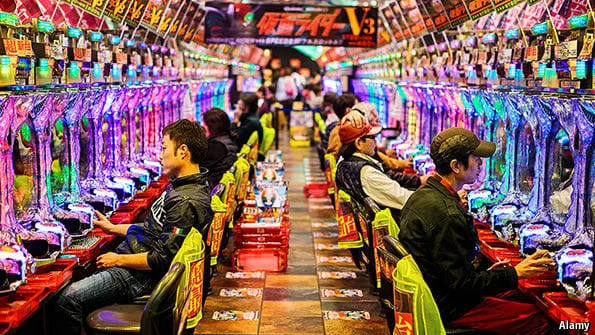Gambling has always been a popular form of entertainment and leisure activity around the world. It has also been a part of Japanese culture for many years, with various forms of gambling being legal and accepted. However, in recent years, there has been a significant increase in the popularity of gambling in Japan, with more and more people indulging in different forms of it.
In this article, we will take a closer look at the statistics of gambling in Japan and dive into the reasons behind its growing popularity. We will also explore the various forms of gambling that are legal in the country and the impact it has on the economy and society.

The History of Gambling in Japan
Before we delve into the current state of gambling in Japan, it is essential to understand its roots and how it has evolved over the years. As in many other cultures, gambling has been a part of Japanese traditions and customs for centuries. Traditional forms of gambling such as Pachinko, horse racing, and lotteries have long been accepted and enjoyed by the Japanese people.
Traditional Forms of Gambling in Japan
Pachinko is a game that originated in Japan in the early 1900s and is considered one of the most popular forms of gambling in the country. It is a combination of pinball and slot machines, where players use small steel balls to win prizes. Pachinko parlors can be found all over Japan, and it is estimated that there are over 11,000 of them in the country.
Horse racing is another form of gambling that has been legal and popular in Japan since the late 1800s. It is regulated by the Japan Racing Association (JRA) and the National Association of Racing (NAR). Horse races are held every weekend at various tracks throughout the country, and bets can also be placed online or through phone betting.
Lotteries have also been a part of Japanese culture for many years, with the first lottery being introduced in the early 1600s. Today, there are two main types of lotteries in Japan – the Takarakuji (big lotteries) and Numbers (small lotteries). These lotteries offer large cash prizes, and their sales contribute significantly to government revenue.
Legalization of Gambling in Japan
Despite the long-standing presence of traditional forms of gambling, other forms of gambling were strictly prohibited in Japan until recently. The Criminal Code of Japan prohibits most forms of gambling, including casino games like blackjack and roulette. However, in recent years, there have been several attempts to legalize gambling in the country.
In 2018, the Japanese government passed a bill to legalize casinos and integrated resorts in the country. This was a significant step towards expanding the gambling industry in Japan and attracting more tourists. The bill allowed for the establishment of up to three integrated resorts, which would include casinos, hotels, conference centers, and other entertainment facilities.
The legalization of sports betting was also seen as a potential source of revenue for Japan. In 2019, a law was passed to permit betting on certain sports events, such as horse racing, soccer, and motorboat racing. While this is still limited compared to other countries, it was a significant step towards the expansion of the gambling industry in Japan.
Impact of Gambling on Japanese Culture
Gambling has been a part of Japanese culture for many years, and it has had both positive and negative impacts. On one hand, traditional forms of gambling have been a source of entertainment and leisure activity for the Japanese people. They have also contributed to government revenue and provided job opportunities.
However, there are also concerns about the negative effects of gambling on Japanese culture. Pachinko, in particular, has been criticized for its addictive nature and the social problems it can cause. The legalization of casinos and integrated resorts has also sparked debates about the impact it could have on Japanese society and values.
Current State of Gambling in Japan

The recent developments in the gambling industry in Japan have led to significant changes in its current state. In this section, we will take a closer look at the statistics and figures that highlight the growing popularity of gambling in the country.
Rising Popularity of Pachinko
Pachinko has long been a popular form of gambling in Japan, but recent statistics show a significant increase in its popularity. The Japanese Gaming Association reported that in 2019, the total number of pachinko parlors in Japan was 11,191, with over 4 million pachinko machines in operation. This is a significant increase from the 10,516 parlors reported in 2018.
According to the JRA, the annual revenue from pachinko reached over 21 trillion yen (approximately $199 billion) in 2019. This is a slight decrease from the previous year, but it still accounts for a significant portion of the gambling revenue in Japan. Pachinko continues to be the most popular form of gambling in the country, with millions of players and thousands of parlors nationwide.
Increase in Lottery Sales
Lotteries have also seen a rise in popularity in recent years, with an increase in sales and revenue. In 2019, the gross sales of Takarakuji (big lotteries) in Japan amounted to 850.6 billion yen (approximately $8 billion), which was an increase of 3.3% from the previous year. The Numbers lottery, on the other hand, saw a slight decrease in sales but still brought in over 460 billion yen (approximately $4.3 billion).
The revenue from lotteries also plays a significant role in government funding, with a portion of it allocated for public works projects and disaster relief efforts. In fact, in 2019, the total amount of government revenue from lotteries reached over 370 billion yen (approximately $3.5 billion). Therefore, it is safe to say that the popularity of lotteries in Japan continues to contribute significantly to the economy.
Emergence of Online Gambling
While traditional forms of gambling are still prevalent in Japan, there has been a noticeable rise in online gambling in recent years. This can be attributed to the advancement of technology and the increasing use of smartphones and other devices for entertainment purposes. Online gambling offers convenience and accessibility, making it an attractive option for players.
In 2018, the Japanese government passed a law to regulate online casinos, known as the “Basic Policy for the Promotion of IR.” This policy allowed for the introduction of online casinos in the country, providing a legal framework for operators to offer online games such as poker, blackjack, and slot machines. This move has opened up new opportunities for the gambling industry in Japan and has led to a surge in the popularity of online gambling.
Economic Impact of Gambling in Japan
The legalization and expansion of gambling in Japan have had a significant impact on the economy, contributing to its growth and development. In this section, we will take a closer look at how gambling has influenced various aspects of the economy.
Contribution to GDP
The gambling industry in Japan has made significant contributions to the country’s gross domestic product (GDP). In 2018, the Japan Productivity Center reported that the total economic impact of the gambling industry was approximately 8.7 trillion yen (approximately $82 billion), which accounted for 1.6% of the country’s GDP. This includes both direct and indirect impacts on the economy.
Direct impact refers to the revenues generated by the gambling industry itself, such as ticket sales, bets, and entrance fees. On the other hand, indirect impact includes the effects of the industry on other sectors, such as job creation and tourism. Therefore, it is safe to say that the legalization of casinos and integrated resorts will have a significant impact on the country’s GDP in the future.
Employment Opportunities
One of the major benefits of the gambling industry is the job opportunities it creates. The Japan Productivity Center also reported that in 2018, the gambling industry provided employment for over 2 million people, including both direct and indirect jobs. This includes positions in casinos, hotels, restaurants, and other related industries.
With the introduction of integrated resorts, there is expected to be an increase in employment opportunities in the hospitality and entertainment sectors. Casinos alone are estimated to create over 100,000 jobs, which would provide a significant boost to the economy. The expansion of the gambling industry in Japan could also lead to spin-off effects, creating job opportunities in other industries such as construction and real estate.
Boost in Tourism
Another major economic impact of gambling in Japan is its potential to boost tourism. With the legalization of casinos and integrated resorts, the country aims to attract more international visitors, particularly those interested in gambling. This has been successful in other countries such as Macau and Singapore, where the introduction of integrated resorts led to a significant increase in tourist arrivals.
In 2019, the Japan National Tourism Organization reported that there were over 31 million international visitors to Japan, a record high for the country. With the development of integrated resorts and the promotion of Japan as a destination for gamblers, this number is expected to increase. This would not only contribute to the economy but also create jobs and opportunities in the tourism industry.
Social Implications of Gambling in Japan

With the growth of the gambling industry in Japan, there have been concerns about its impact on society and the potential negative consequences it could bring. In this section, we will explore some of the social implications of gambling in the country.
Rise in Problem Gambling
The increase in the popularity of gambling in Japan has also led to a rise in problem gambling. According to a study by the Ministry of Health, Labour and Welfare, approximately 3.6% of the Japanese population has a gambling disorder. This is slightly higher than the global average of 2.3%, and it is estimated that there are around 5 million problem gamblers in Japan.
Problem gambling can have severe consequences on individuals and their families, leading to financial problems, mental health issues, and other social problems. The Japanese government has recognized this issue and has introduced measures to tackle problem gambling, such as creating awareness and providing support through counseling services.
Impact on Society
Gambling also brings with it social stigmas and negative perceptions in society. In Japan, problem gambling is often seen as shameful and taboo, which can prevent individuals from seeking help. There is also a concern about the potential for an increase in crime rates with the introduction of casinos and an increase in gambling activities.
Moreover, there is a fear that the expansion of the gambling industry could lead to an increase in gambling-related problems among youth. The legal age for gambling in Japan is 20, but there are concerns that young people may be attracted to online gambling, which could lead to addiction and other issues.
Responsible Gambling Measures
To address these social implications, the Japanese government has introduced responsible gambling measures. These include regulations and restrictions on casinos and integrated resorts, such as limiting the number of casino visits for locals and banning ATMs inside casinos. The government has also focused on promoting responsible gambling practices and providing support for those struggling with problem gambling.
Comparison with Other Countries
Japan is not the only country to have legalized gambling in recent years. In this section, we will compare its current state with that of other countries and explore the lessons that can be learned from their experiences.
Similarities with Macau and Singapore
Macau and Singapore are two countries that have seen significant growth in their gambling industries in recent years. In 2019, Macau’s gross gaming revenue reached over $36 billion, while Singapore’s reached approximately $4 billion. Both countries have also seen an increase in tourism due to the development of integrated resorts.
Like Japan, both Macau and Singapore have strict regulations in place for their gambling industry. This includes a limit on the number of casinos and the implementation of responsible gambling measures. Integrated resorts have played a significant role in the growth of the gambling industry in these countries, and it is expected that they will have a similar impact in Japan.
Differences with the United States
The United States is known for its thriving gambling industry, particularly in destinations like Las Vegas and Atlantic City. However, there are notable differences between the gambling markets in Japan and the US. For example, while in Japan, traditional forms of gambling are more popular, in the US, casino games like blackjack and poker are the main attractions.
There are also differences in the legal framework and regulations surrounding the gambling industry in both countries. In the US, each state has its own laws and regulations, while in Japan, the central government sets the rules. Moreover, cultural and societal factors also play a role in the gambling industry in both countries.
Lessons Learned from Other Countries
There are several lessons that can be learned from the experiences of other countries when it comes to the expansion of the gambling industry. For Japan, it is crucial to strike a balance between economic growth and social responsibility. Regulations and restrictions must be in place to prevent potential negative consequences, such as problem gambling and crime rates.
Moreover, it is essential to consider the cultural and societal factors that could influence the success of the gambling industry in Japan. A thorough understanding of these factors can help in creating a sustainable and responsible gambling market in the country.
The Future of Gambling in Japan
The future of gambling in Japan looks promising, with various developments on the horizon. In this section, we will explore some of the upcoming developments, challenges, and opportunities for the gambling industry in the country.
Upcoming Developments
The first step towards the development of casinos and integrated resorts in Japan is the issuance of casino licenses. The process has been delayed due to the ongoing pandemic, but it is expected that the first licenses will be issued in 2021. The construction of integrated resorts is also expected to begin in 2021, with the first resort set to open its doors to the public in 2025.
Apart from the development of integrated resorts, there have also been talks about expanding gambling activities to other regions in Japan. This could include allowing more types of sports betting and introducing new forms of online gambling. However, the exact timeline for these developments is yet to be determined.
Challenges and Opportunities
One of the main challenges for the gambling industry in Japan is competition with other forms of entertainment. The country already offers various options for leisure activities, such as shopping, theme parks, and traditional cultural experiences. Therefore, it is essential for the gambling industry to differentiate itself and offer unique attractions to attract visitors.
Another challenge is the potential for expansion in other regions. While Tokyo and Osaka have been identified as potential locations for integrated resorts, there are calls for other regions to also be considered. This could mean more competition between different regions and cities, as well as challenges in terms of infrastructure and resources.
On the other hand, the development of integrated resorts presents several opportunities for the gambling industry in Japan. It allows for the creation of new jobs and employment opportunities, particularly in the hospitality and entertainment sectors. It can also attract more international visitors and increase revenue for the country.
Prospects for Growth and Revenue
The future of the gambling industry in Japan looks bright, with various projections and forecasts showing significant growth potential. According to a report by the Japan Productivity Center, the total economic impact of the gambling industry is expected to reach 9.5 trillion yen (approximately $90 billion) in 2030, which would account for 1.75% of the country’s GDP.
Moreover, with the development of integrated resorts, it is estimated that Japan’s gaming market could become the third-largest in the world, behind only Macau and the United States. The projected revenue from casinos and integrated resorts ranges from $8 billion to $25 billion per year, depending on the number of licenses issued and their locations.
Conclusion
In conclusion, the statistics and figures show the growing popularity of gambling in Japan and its potential for economic growth and development. From traditional forms of gambling like Pachinko and lotteries to the legalization of casinos and integrated resorts, the gambling industry in Japan has come a long way.
However, it is essential to consider the social implications and challenges that come with the expansion of the gambling industry. Responsible gambling measures must be in place, and lessons must be learned from the experiences of other countries to ensure sustainable growth and development of the industry.
Overall, the future of gambling in Japan looks








